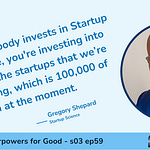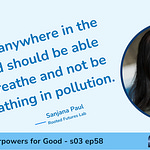I’m not a financial advisor; nothing I write in Superpowers for Good should be considered investment advice. You should seek appropriate counsel before making investment decisions.
Remember, you can watch the Superpowers for Good show on e360tv. To watch the episode, download the #e360tv channel app to your streaming device–Roku, AppleTV or AmazonFireTV–or your mobile device. You can even watch it on the web or YouTube.
When you purchase an item, launch a crowdfunding campaign or invest after clicking a link here, we may earn a commission. It’s an easy way to support our work.
Devin: What do you see as your superpower?
Mark: I've been an active ceramist. I'm a craftsman. I love the crafts, which are different than the fine arts. Architecture is first a craft, which is to make something work. Then there's the next level: to make it work beautifully. Then, if you keep going, you enter the fine arts. But you have to start with the crafts to make things work.
After building a successful architectural firm in New York City, Mark Winkelman was looking for projects with more impact and scale. When he found the Pajama Factory in Williamsport, Pennsylvania he recognized his new home.
Mark describes the history of the Pajama Factory:
It's an accumulation of eight industrial buildings that started in the 1800s, 1883; Lycoming Rubber Company invented and made Keds sneakers here for about 15 years.
Then it rolled into the depression, and they rented out space to various shoe companies and Weldon Pajama Company. There were fabric companies, and they made garments. Weldon grew and eventually bought the building in 1950 or 52 and renovated it a little bit.
Then they went out of business in the 70s, I think. No one was wearing pajamas in the 70s. That's probably why that happened.
But anyway, it's a very large complex of 300,000 square feet in eight buildings surrounding a courtyard. We have been renovating it in pieces for the creative class–for artists and small businesses. We do this by dividing up the big floor plates into smaller spaces. We've got 160 spaces rented now and built. We're 100% occupied.
He also described the current varied use of the space:
We've got a little of everything. We run two nice Airbnb units, and we use them to invite folks out and check it out. We have maybe a dozen folks living here. Well, some of them are just living in their studios, but otherwise, we have half a dozen apartments.
Then we've got a hundred other spaces. We have all kinds of businesses in them. The ground floor is more retail. We've got event spaces. We've got the community wood shop, the clay studio, a pasta maker, a great coffee roaster and coffee shop. We've got a bicycle recycle shop. The list goes on and on. We have a mosque. We have a selfie lounge. We have an art store. It goes on and on.
Mark is now leading a capital campaign that includes a regulated investment crowdfunding campaign hosted by Small Change. He explains the strategy:
We've got a grant from the state. We've got some money from a bank. So this [crowdfunding campaign] is a piece. I mean, at 300,000 square feet, ultimately, it needs millions to restore the building. So, we keep piecing away at it.
What we hope to do in this next round–which we've started–is to deal with some parking lots, heating, ventilating, and air conditioning systems, and we need to do roofs. The difficulty we've had is that banks require cash flow; you borrow against cash flow. But when you buy an empty building, you have no cash flow. And this is just this huge building in this small town, and nobody could imagine how it would get filled up.
So, we need to borrow money from outside the traditional sources to build, expand, and allow the capital to grow. This has meant that we've deferred long-standing maintenance and improvement issues, and we need to take care of them now. It's pretty clear the project is going to be a complete success. Now it's a half success. At least it's something.
The project is now an essential part of Williamsport. “The pajama factory seems to be hugely appreciated by an awful lot of people. It's the young who generally leave town; they're finding excuses to stay here,” Mark says.
To create this impact, Mark has deployed his craft as a superpower.
AI Episode Summary
Here's a summary of the key points from the transcript:
1. Mark Winkelmann is an architect who has developed a project called the Pajama Factory in Williamsport, Pennsylvania.
2. The Pajama Factory is a complex of eight industrial buildings that have been repurposed to house artists and small businesses with spaces for creative work and living.
3. The buildings began as a rubber company in 1883, eventually housing the production of Keds sneakers and later pajamas before they were converted into the current creative space.
4. The Pajama Factory includes a variety of spaces, such as Airbnb units, apartments, artistic spaces, light manufacturing, a community woodshop, a clay studio, a coffee roaster, and retail spaces.
5. Mark moved to Williamsport specifically for the Pajama Factory project after many years as an architect in New York City and the desire to take on significant projects.
6. The project is currently raising capital on Small Change, a crowdfunding site for social impact real estate projects. The funds will be used for maintenance, HVAC systems, parking lots, and roof repairs.
7. The Pajama Factory has become an important part of the local community, attracting and retaining residents and supporting the growth of businesses.
8. There is a waiting list for spaces at the Pajama Factory due to its popularity, with a turnover of around 10% per year.
9. Future plans for the Pajama Factory include the creation of more studio spaces and additional apartments, ranging from affordable units for artists to high-end lofts.
10. Mark's superpower lies in the combination of his architectural skills, his experience with historic buildings, his love for interacting with people, and his appreciation for craftsmanship, all of which contribute to the success of the Pajama Factory project.
To learn more about the Pajama Factory and connect with Mark, visit the website pajamafactory.net, and for information on the crowdfunding campaign, visit smallchange.co.
How to Develop Craft As a Superpower
Craft as a superpower is intriguing to me. Mark describes it as lying on a spectrum between function and fine art. As an architect, he says, “There are people that put up a building, and then there are people that make an art statement with buildings.”
He says this concept has a metaphorical application to almost any discipline. “I guess it goes a step further with community building, which has nothing to do with the physical. It has everything to do with people and interactions. It takes care. What is a craft? A craft is you're making something better than it needs to be to simply function.”
He explains his approach to building a home as a craft to explain how to develop your craft:
When working on architecture, I get a brief: build a house. That's simple enough; you put some bedrooms together and make the thing work. I then proceed to take that simple problem and make it complicated, adding in all these other aspects. Where does the sun come up? Where's the weather coming from? How many, how many guests come in? How often? How does this structure work ideally in so many different ways?
I make a complicated problem and then try to solve that problem. Then maybe it's beautiful because it works on so many levels.
One vital aspect of developing your craft, he says, is to set high or difficult goals to get past mere function.
By following Mark’s example and advice, you can make your work into a craft, adding beauty to functionality. With practice, you could make this a superpower that enables you to do more good in the world.
Remember, however, that research into success suggests that building on your own superpowers is more important than creating new ones or overcoming weaknesses. You do you!
Guest Profile
Mark Winkelman (he/him):
Owner/ executive director, Pajama Factory LLC
About Pajama Factory LLC: The Pajama Factory, a complex of eight historic buildings that were once the largest pajama factory in the world, is being restored and repurposed into a mixed-use development that includes individual spaces for artist’s studio as well as retail, light manufacturing, living, and community facility spaces.
Website: PajamaFactory.net
Company Facebook Page: facebook.com/pajamafactory
Instagram Handle: @pajamafactory
Biographical Information: I‘m 68, developing a huge historic factory complex in a small rust belt city, lived/live in Tokyo and NYC, principal founder of Downtown Group Architects — since 1984, and a ceramic artist.
Most influential books:
● The World is Flat
● The Creative Class
● Good Morning, Beautiful Business
● The New Geography of Jobs
Growing up in a middle-class household in suburban New Jersey, Mark Winkelman decided at an early age, with the encouragement from his interior designer mother, to pursue architecture. To that end, he attended and graduated from the Syracuse School of Architecture in 1978. Upon graduation, he interned in Phillip Johnson’s highly acclaimed design firm in New York City. While in Johnson’s office, he worked on a number of notable high-rise office buildings, including the gothic PPG Headquarters in Pittsburgh and the iconic postmodern AT&T headquarters in New York City.
After earning his New York State architectural license, Mark and his then-girlfriend (and now wife) traveled to and worked in Tokyo, Japan, for two years. There, he came to appreciate the refined visual aesthetic that is uniquely Japanese. The design lessons learned in Japan would deeply inform and influence Mark’s own design work. Perhaps the most important lesson was grasping the importance of putting new work in an historical context.
Upon returning to the States in 1984, Mark partnered with a Syracuse classmate and formed Downtown Design — a boutique architecture and interiors firm based in New York City. For the next 25 years, Downtown Design grew and developed a number of specialties, including the design of technical media facilities such as recording studios and video edit suites. The firm’s projects also included the restoration and adaptive reuse of historical loft buildings in the creative neighborhoods of Soho and Tribeca in Manhattan. Indeed, one of the loft projects was his family’s own home in an 1894 spice warehouse.
In 2007, Mark and Suzanne bought the complex of historic and vacant factory buildings in Williamsport, PA. According to Mark, the building and their potential were enough to bring him to Williamsport. The Winkelman’s have honored local history with the name “Pajama Factory” and the continuing restoration and preservation of the 100 (plus) year-old buildings.
Linkedin: Linkedin.com/in/mark-winkelman-355aa047
Upcoming SuperCrowd Event Calendar
If a location is not noted, the events below are virtual.
SuperCrowdBaltimore, March 21, 2024: This in-person event at the B&O Rail Museum features some of Baltimore’s prominent citizens and community leaders. Save 30 percent with the discount code “SuperCrowd.”
Impact Cherub Club Meeting hosted by The Super Crowd, Inc., a public benefit corporation, on March 26, 2024, at 1:00 PM Eastern. Each month, the Club meets to review new offerings for investment consideration and to conduct due diligence on previously screened deals. Everyone is welcome to join the free events.
SuperCrowdHour, March 27, 2024 at 1:00 Eastern. Devin Thorpe will explain the three surprising reasons impact investors should seek to make money from impact investing.
Superpowers for Good - Kinect Capital Live Pitch, March 28 at 9 PM Eastern/6 PM Pacific: Four companies currently raising via crowdfunding will pitch their offerings live via the Superpowers for Good streaming television show on e360tv. Kinect Capital will host the pitch. Applications to pitch are open now through March 8!
SuperCrowd24, April 17-18: This two-day virtual event is our biggest event of the year. Don’t miss it. Save 50 percent with the discount code “SuperCrowd.”
SuperCrowdChicago, June 12, 2024. Save the date! More information is coming soon!
Recently, we created an AI GPT to help you learn more about The Super Crowd, Inc., a public benefit corporation, and our upcoming events. Click here to try it.
SuperCrowd Community Event Calendar
Digital Peacebuilding Expo, March 13, 12-5 PM, Washington, DC, hybrid
Crowdfunding Professional Association Webinar Series - March 13, 2:00 PM ET
Investment Crowdfunding Demystified, Crowdfund Better, March 26 at 2:00 PM ET
If you would like to submit an event for us to share with the 4,000+ members of the SuperCrowd, click here.
















